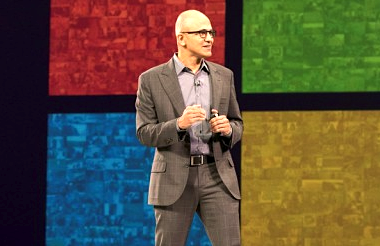 New innovations, investments and partner opportunities were unveiled by Microsoft at its annual Worldwide Partner Conference in Florida. Microsoft CEO Satya Nadella (pictured) introduced Project GigJam, an initiative to 'reinvent productivity and business processes' by breaking down the barriers between devices, apps and people.
New innovations, investments and partner opportunities were unveiled by Microsoft at its annual Worldwide Partner Conference in Florida. Microsoft CEO Satya Nadella (pictured) introduced Project GigJam, an initiative to 'reinvent productivity and business processes' by breaking down the barriers between devices, apps and people.
"GigJam empowers business workers to summon information from their line of business and SaaS apps, spontaneously divvy up the specific information and actions needed to get work done, keep track of each part, and bring it all to closure immediately," he said.
Phil Sorgen, Corporate Vice President, Worldwide Partner Group, Microsoft, showcased new technology innovations that demonstrate Microsoft's ambition to reinvent productivity and business processes, build the intelligent cloud and create more personal computing.
"We also discussed investments the company is making in programs for our hundreds of thousands of global channel partners at the centre of business transformation taking place in the industry," he said.
"These innovations and investments will help Microsoft and our partners achieve our new mission together on a global scale, making a difference in lives and organisations in all corners of the planet."
Microsoft also announced the Cortana Analytics Suite, a fully managed set of services to help businesses transform data into intelligent action.
"The growing adoption of machine learning, big data combined with the power of unlimited storage and compute in the cloud presents a unique opportunity for organisations to anticipate what will happen and to automate business outcomes," said Sorgen.
"Cortana Analytics Suite brings together leading technology infrastructure including machine learning, big data storage and processing with perceptual intelligence such as vision, face and speech analysis, extending predictive and prescriptive capabilities to businesses for a range of industry scenarios.
"Cortana Analytics Suite integrates with Cortana, Microsoft's digital personal assistant.
"Cortana works with the Cortana Analytics Suite to enable businesses to get things done in more helpful, proactive, and natural ways. Availability will be this fall through a simple monthly subscription."
The third area of innovation showcased was around commercial momentum in response to HoloLens - a fully untethered holographic computing device powered by Windows 10.
On-stage at WPC, Nadella showed how a MS partner, Autodesk, will use HoloLens to fundamentally change how design professionals create, communicate, visualise and work.
"HoloLens is already making an impact across a number of industries, examples include the work we are doing to help architecture and construction industry professionals through Trimble, working on Mars exploration with NASA's Jet Propulsion Laboratory and helping Case Western Reserve University and the Cleveland Clinic transform teaching for the future," said Sorgen.
"This is just the beginning of what holographic computing can help customers do more and achieve more."
The software giant also revealed details on creating new partner opportunities across cloud and mobility.
"We know that many of our partners are investing in transitioning their businesses to the cloud, in part to take advantage of the types of cloud-based innovations as mentioned above," added Sorgen. "So, we're making several partner investments to make their transition more seamless.
"We are expanding the Cloud Solution Provider (CSP) program to help partners continue to build and grow profitable cloud services businesses using Microsoft Cloud.
"Beginning today, Microsoft will expand CSP to additional markets, bringing the total number of markets in which CSP is available to 131.
"Additionally, Azure and CRM Online will join Office 365, Windows Intune and Enterprise Mobility Suite (EMS) as available services in the CSP.
"In addition, as a result of the overwhelming interest from partners and positive feedback we've received from customers over the past two years, we are delivering on our promise to grow the opportunity for more partners to sell Surface - taking the number of resellers from a few hundred to a few thousand globally in the coming months.
"Surface is an integral part of our Windows strategy, and the expansion of this program coinciding with the upcoming launch of Windows 10 creates exciting opportunities for partners.
"We're also investing in helping partners unlock customer mobility opportunities with new competencies for Windows 10 and Enterprise Mobility Suite (EMS) that will enable them to differentiate their expertise and grow their business."
Sorgen also revealed details about a new premium Office 365 enterprise suite called E5, to be launched before the end of this year.
E5 will encompass the core value of Office 365 productivity and collaboration capabilities, as well as new innovations including newSkype for Business services such as Cloud PBX and Meeting Broadcast, Power BI & analytics features and new advanced security features such as eDiscovery, Customer Lockbox, and Advanced Threat Protection.
"The E5 suite will provide a significant new opportunity for partners to build new service offerings around real-time communication and analytics, and to reach new customers with important new security features," added Sorgen.
"In this mobile-first, cloud-first world, those businesses that embrace technology to reinvent themselves and their industries will thrive, and those who embrace status quo risk extinction.
"Its Microsoft's hundreds of thousands of global partners that will bring about this transformation, help our mutual customers through this change and forge the next industrial revolution."

 Comms-care's seventh annual Partner Golf Day held at the Celtic Manor 2010 Golf Course saw each team headed up by a member of Comms-care, with team-Ricoh ultimately triumphing under the leadership of Comms-care's MD Ben Davies (pictured far right).
Comms-care's seventh annual Partner Golf Day held at the Celtic Manor 2010 Golf Course saw each team headed up by a member of Comms-care, with team-Ricoh ultimately triumphing under the leadership of Comms-care's MD Ben Davies (pictured far right). New innovations, investments and partner opportunities were unveiled by Microsoft at its annual Worldwide Partner Conference in Florida. Microsoft CEO Satya Nadella (pictured) introduced Project GigJam, an initiative to 'reinvent productivity and business processes' by breaking down the barriers between devices, apps and people.
New innovations, investments and partner opportunities were unveiled by Microsoft at its annual Worldwide Partner Conference in Florida. Microsoft CEO Satya Nadella (pictured) introduced Project GigJam, an initiative to 'reinvent productivity and business processes' by breaking down the barriers between devices, apps and people. Three new starters have brought a variety of skills sets to fast expanding Fidelity Group.
Three new starters have brought a variety of skills sets to fast expanding Fidelity Group.